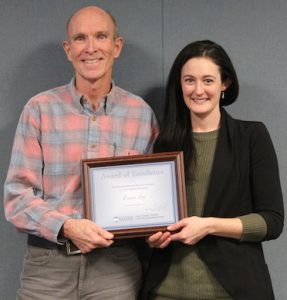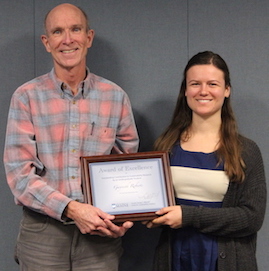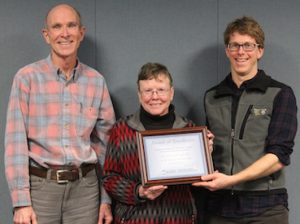2018 Mitchell Center Sustainability Awards
2018 Mitchell Center Awards
Mitchell Center Sustainability Awards have been presented annually since 2013. The awards are designed to recognize and celebrate the accomplishments of Mitchell Center members, researchers, students and external partners who have helped advance the values and principles at the heart of the Mitchell Center’s stakeholder-engaged, solutions-focused, interdisciplinary projects and partnerships. Below, the award winners are introduced in the words of their nominators.
Outstanding mentorship of student in sustainability research
Emma Fox

As a Ph.D. student in Ecology and Environmental Sciences, Emma began mentoring Kaitlyn Raffier, an undergraduate research assistant (RA) on the Future of Dams (FoD) project, in November 2016. From the beginning, Emma engaged Kaitlyn in all aspects of the shared research and in the network of more than 70 multistate, interdisciplinary FoD researchers. As she took on the role of primary mentor, she arranged regular research meetings withKaitlyn, helped her set goals, and provided guidance and instruction on new ideas and current progress. Emma also led monthly lab meetings providing useful guidance for navigating the complicated world of research and academics for other undergraduate and graduate students. Notes her nominator, “Emma is a kind, dedicated and talented mentor
Outstanding graduate student contribution to sustainability research
Parker Gassett

Parker is working towards a Ph.D. in Ecology and Environmental Sciences.What began as a theoretical assessment of the management opportunities for ocean acidification has expanded to include his engagement as a steering committee member of the Maine Ocean and Coastal Acidification Partnership, direct involvement in decision-making at the Augusta State House, and contributions on how to develop a novel approach to community-based citizen science solutions. Says Parker’s nominator, “His commitment and enthusiasm for community organizing among water quality stakeholders and citizen science organizations has helped regional collaborative water monitoring efforts to advance inclusively. He’s led a ground-breaking set of workshops that have catalyzed regional conversations involving millions of dollars of research funding. Parker is becoming an impressive scholar and practitioner of sustainability science.”
Outstanding undergraduate student contribution to sustainability research
Gwyneth Roberts

Gwyneth is pursuing a dual Ecology and Environmental Sciences/Mathematics degree. Her research is focused on understanding tidal processes in the Jordan River in Trenton—a continuation of coastal pollution research begun under the New England Sustainability Consortium (NEST) Safe Beaches and Shellfish Areas project. Her work includes direct coordination with the de Koning family, owner of Acadia Aqua Farms (AAF), and an important stakeholder involved with shellfish harvesting in Maine.Notes her nominator, “Her research is helping address AAF’s concern with bacterial pollution events in the estuaries where they grow mussels. She has developed a productive relationship with AAF and shown an extraordinary ability to conduct research that integrates field measurements and numeric modeling to help address industry concerns.”
Outstanding contributions by an external partner to research collaborations
Penobscot Nation Water Resources Program: Jan Paul, Angie Reed, John Banks, Dan Kusnierz, Jake Paul, Jason Mitchell, and Dan McCaw

Members of the Penobscot Nation’s Water Resources Program have drawn on the tribe’s millennia-long relationship with their river to advance culturally- and spiritually-enriched science. Every year, the team conducts weekly sampling at more than 100 sites throughout the Penobscot River. The sampling is so rigorous that state and federal environmental agencies rely on it to accurately characterize the river’s status. Notes the team’s nominators, “Their work has directly supported all stages of the New England Sustainability Consortium’s Future of Dams (FoD) project. For example, they have hosted a series of cross-cultural dialogues between FoD researchers and Penobscot Nation members, which has helped in understanding how decolonizing methodologies can support sustainability science”. Team members also co-designed a UMaine environmental communication course, helping students appreciate the value of integrating traditional ecological knowledge and western science in pursuit of environmental justice. Decolonizing methodologies are a set of approaches for responding to the impacts of colonialism.
Outstanding contribution toward the development of solutions by a research team.
Adam Daigneault, Linda Silka, and the Katahdin Indicators Team

The Katahdin region is central to Maine’s forest products economy, outdoor recreation tradition, and forest conservation in the North Woods. It has also become the most visible face of the decline of a once-robust forest products industry. The Katahdin team’s work provides a springboard for discussion as the communities, from Millinocket to Patten, explore new ways to value their resources and diversify the local economy. The team worked to ensure that the economic baseline reports they developed included information that is meaningful to the local communities. The team also developed a survey to measure community well-being and resilience. The team’s nominator notes. “Their research has been integral to strategic decision making during the locally-led visioning process and it will be a critical component as the region works to build capacity to implement action items identified through the process.” Team members include Mindy Crandall, Sandra De Urioste-Stone, and Aaron Weiskittel.
